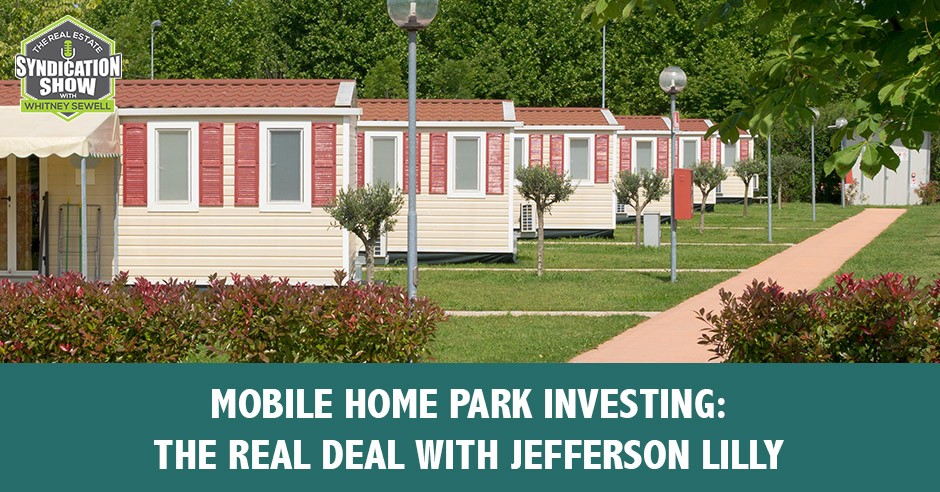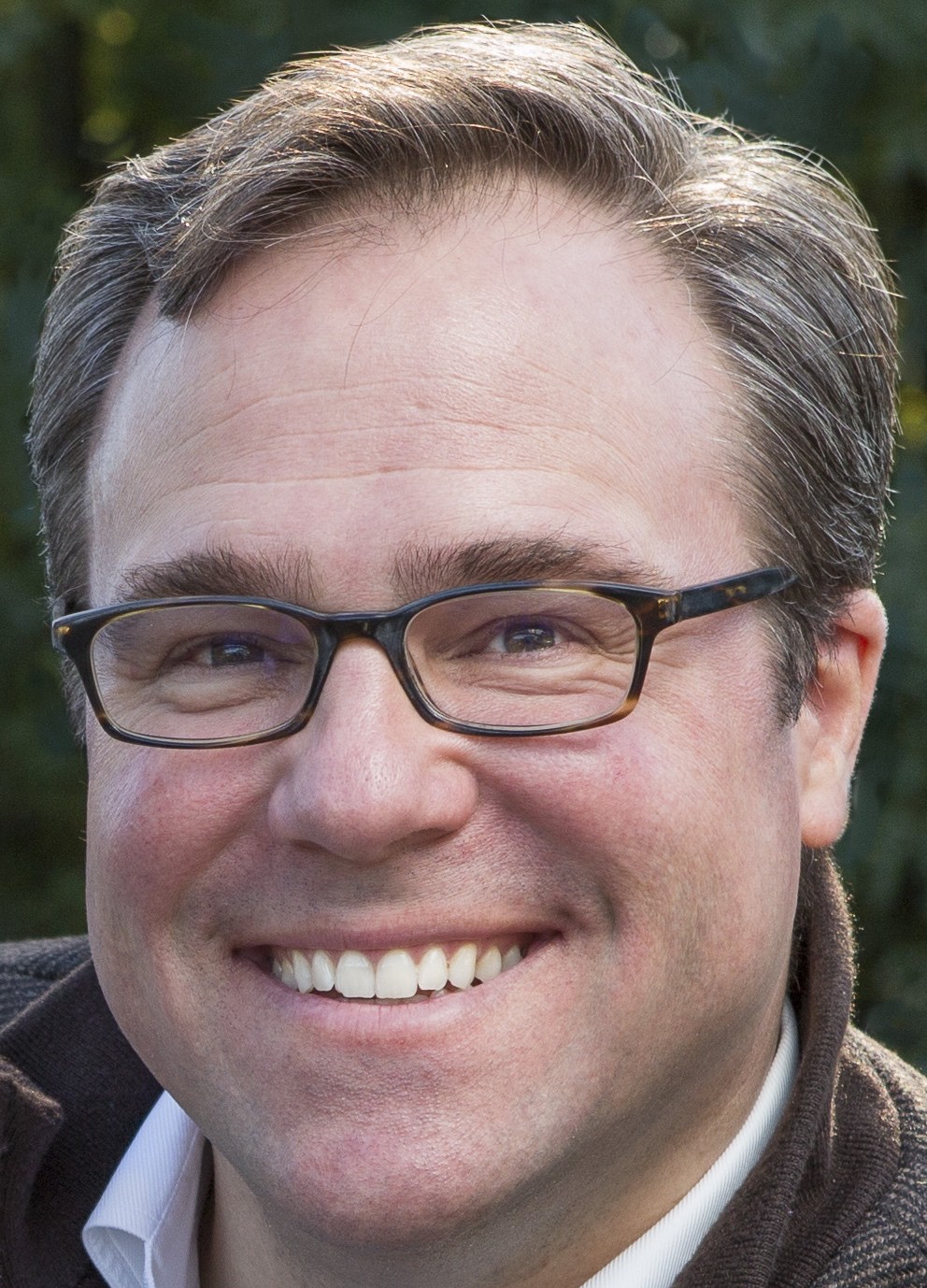
Listen to the podcast here:
Mobile homes have long been ideal preferences for many. One of the best go-to persons to learn more about it is Jefferson Lilly. Jefferson is the host of the podcast Mobile Home Park Investing where he shows why investing in such homes is not only profitable but also unique and exciting. This conversation could be a great guide on mobile home park investing for beginners.
Jefferson was trying to analyze real estate deals in multifamily housing across the Midwest in order to look for ways to provide value and earn returns. What he found was surprising. He said that where most multifamily apartment buildings were returning 8%, a mobile home park in the same locality was paying 10%, showing that they’re more profitable. He also discovered that this holds true repeatedly in other areas across the country. This led him into syndicating mobile home parks over the last eleven years to acquire 25 mobile home parks in thirteen states. Join Whitney and Jefferson as they go in-depth on mobile home park syndication and share some tips on what to look for when it comes to selecting mobile home parks.
—
Watch the episode here:
Listen to the podcast here:
Mobile Home Park Investing: The Real Deal with Jefferson Lilly
In our conversation on mobile home park investing, we’ll discuss the benefits of syndication and share tips on what to look for when selecting mobile home parks.
Our guest is Jefferson Lilly. Thanks for being on the show, Jefferson.
Thank you for having me, Whitney.
Jefferson is one of America’s top 50 mobile home park operators and owners with 25 mobile home parks in thirteen states. He was featured in Bloomberg Magazine, The New York Times and Real Money TV Show. He started the world’s first Mobile Home Park Investing Podcast and now has more than 15,000 downloads per month. He founded the world’s largest mobile home park investing group on LinkedIn with more than 4,500 members. We can have a whole show on that. That’s awesome. Thanks again for being on the show, Jefferson. I’m looking forward to our conversation. Tell the audience a little more about who you are in case they haven’t heard of you and then we’ll start in.
I got into this business many years ago. I owned mobile home parks. I started off looking for some stable passive income. I had worked in the dot-com business and went through the dot-com boom-bust and semi-resurgence. I was looking for some passive investments and stumbled upon mobile home parks. I’ve been doing this now for many years and now I syndicate, raise money from other people, cumulatively over about 170 other investors so far have invested with me. During that time, I’ve gotten married to a lovely woman and have three kids age five and under so I’m busy.
You were looking for a stable passive investment and that’s what led you to real estate. How did you decide on a mobile home park? Why not multifamily, self-storage or even house flipping? Why mobile home parks?
Initially, I did think that I would buy an apartment building. I was on LoopNet and would do a filter for multifamily properties. I live out in San Francisco. I knew I was not going to find affordable property in San Francisco. I was already looking in Lubbock, Texas and Peoria, Illinois, and the greater Midwest. Wherever I’d look, there would be 99 apartment buildings at an eight cap. This was the pricing from many years ago. There would be one mobile home park at ten or eleven cap rate. The audience can think of that as the return that you would get on your money unlevered. If you paid cash, you’d get 8% or 11% on your money. The first time I saw that I thought, “That’s absurd. I’m not buying a trailer park.” I deleted the search results and did it again in Lincoln, Nebraska or Omaha. I probably had to get hit over the head with me five or ten times, but it finally clicked. I thought, “Mobile home parks are multifamily. If they’re yielding that much more money, why don’t I look into it?” I did that and it clicked pretty quickly why it’s such a compelling niche. I began to focus on it. It’s the best thing going better than self-storage.
Were you looking to invest passively with another operator at that time or were you jumping in saying, “I’m going to do this and I’m going to be an operator?”
I was jumping in. I knew it wasn’t going to be 100% passive, but I was looking to own a property directly, which is what I ended up doing. It didn’t turn out to be an apartment building like I thought it would. It turned out a year and a half later to be a mobile home park.

As far as mobile home parks specifically, how are you picking locations for something like a mobile home park? Everybody says market. With the way the market is, how are you picking locations for mobile home parks and why?
We tend to invest for cashflow, which means we are generally purchasing properties in the greater Midwest. It’s highly unlikely we would ever pay up to have something that’s coastal California or coastal Florida. We look for cashflow. That leads us primarily to the Midwest. We then do have a couple of pages of diligence that we do on parks before we buy them. To do a quick and dirty screen on them, we’re looking for healthy and at least decent-sized economies to invest in. For us, the healthy part means that the average household income is $40,000 and up, and we want to see the average house price at $100,000 and up. By definition, that weeds out places like Detroit, Michigan, Toledo, Ohio, Youngstown, Ohio. Some of the places that have unfortunately fallen on hard times. They have average household incomes of $32,000 and average house prices of $65,000. We can’t compete with that. We look for those economic indicators that means it’s a healthy metro. In general, we’re investing in metros that are 100,000 people or larger. We do have two pages worth of diligence to get through before we close, but as an initial screen, if you’ve got those three things going for you, then it’s almost certainly a deal that’s worth pursuing.
How many markets are you looking at the same time?
We get emails every single day from brokers. We do some of our own prospecting outbound. We cold call mobile home park owners. Maybe at any given time, we’re considering eight or ten deals and most of those will pass on by the end of the day or the end of tomorrow. There is always something new coming in tomorrow or the next day. You certainly don’t have to do every deal. You just have to do a relatively limited number of good deals.
Can you walk us through that process a little bit of how you would be eliminating a deal? Mobile home parks are not my specialty. How are you eliminating eight or ten deals that fast? What are some things that we should be looking for?
In addition to what I’ve mentioned, we’re also looking at the price. We will see some of these deals from brokers, and the broker will manage our expectations that the price has to be that high. The seller wants a five cap on something. It could be the price that we pass on. A number of those deals will be in weaker economies. We pass for that reason. We’ll also pass on deals unless there’s something compelling about them, for instance, a lower price. We’ll pass on deals that have a very high number of what we call park owned homes. Those are pretty much what they sound like. They are the homes that you as the landlord own. We prefer to run this business as a parking lot business. We like to help our residents own their own homes.
We like to buy parks where the residents already own their homes and pay us the lot rent into the ground. Parks with a very high number of park owned homes, we call those horizontal apartment buildings. The implication there where you as the park owner own a lot of the homes is first, all that repair and maintenance will fall on you. All those proverbial leaky toilets and leaky roofs will be your responsibility, the same way as it would be if you owned an actual apartment building. We’d rather have lower repair and maintenance. Secondly, rental homes, not the ones that residents own, but rental mobile homes tend to attract a very rough client base. You’ll almost certainly be starting off with people that will unfortunately disrespect the houses and do a lot of damage to them.
It’s much more important to buy a park where the residents already owned most of those homes. We’ll bring in additional homes to fill any vacancies. That’s okay. We won’t rent them though. We’ll put them out on a rent to own agreement where we work with a partner that’s a subsidiary of Berkshire Hathaway, Warren Buffett’s large company. They will finance the houses and put a proper mortgage against them. We build communities of owners and we help people become homeowners and get out of apartment buildings. It can be tough to start with a park that is a horizontal apartment building. Unless the price is particularly compelling, owning a lot of the mobile homes would be a reason that we might pass as well as all the other things I’ve mentioned.
[bctt tweet=”You’re not a monopolist when you own a mobile home park; you’re an oligopolist.” via=”no”]
That’s a great explanation there, the rental mobile home park, I can only imagine. What team do you have to be able to scale like you have and be operating this many mobile home parks?
I run a couple of partnerships. What I built so far and I’m building up with my new Park Avenue Partnership. What we’ve built prior has been headquarters of four full-time people. That’s one asset manager and three people doing accounting. That’s a controller, an accounts-payable person and an accounts-receivable person. We have a couple of regional managers that also oversee some of those community managers. The regional managers are full-time. The community managers, most of them are not. We do have a couple of them that are full-time at some of our larger properties. It’s a long-winded way of saying we’ve got four people full-time at headquarters and almost two dozen other people out in the field closer to the properties operating them.
Do you have people on the team that are constantly looking for deals, constantly cold calling and doing some type of mail marketing or anything like that?
We do. We’re looking to add to that team. We’ve got somebody that’s doing cold calling pretty much full-time. We will start doing some postcard mailers and some follow-ups with people that were calling. We may well add on an additional person to help us do that.
What’s been the biggest lead source or the quality lead source like mailers or cold calling in addition to mailers or actual brokers?
It’s probably been more our own cold calling. We know other people that we call bird doggers. They’re not official brokers but they make their own cold calls. They may come to us with a property off-market and say, “Pay me $25,000, $50,000, sometimes $100,000,” if it’s a very well-priced and larger deal. Those people that are doing their own cold calling and are referring deals to us are also a good source in addition to our own cold calling. As you can imagine, a lot of stuff that comes from brokers certainly may be good quality. It’s just not likely to be well-priced. We prefer to try and find deals directly ourselves. We establish a conversation with the seller directly. We make it clear that we are not brokers. We are not going to alarm their tenants. We’re not going to shop a deal widely. We have cash and can close all cash quickly. We’re closing on about a $7.25 million portfolio. That will be all cash and a quick close. Those things appeal to some sellers.
You’re able to do the cash because you have a fund.
Yes, I’ve already got the cash sitting in the bank and they’re for months, so now I have something to do with it.

Why a fund instead of doing individual syndications?
There are a couple of reasons. The first is with cash in the bank, I can close quickly. Doing diligence on a deal is not quite a full-time job, but it certainly can take a fair amount of time. If you’re under the gun and trying to close on a deal inside of 30 days, it’s a lot. It’s not impossible. It depends on your contacts, but it’s a lot to both be doing diligence on the property, trying to coordinate all the legal stuff and you still want to do a phase one, probably want to get a survey done. It’s a lot to do that, plus then you have to be making phone calls, traveling, doing dinners, whatever it takes to raise money. When I launched the Park Avenue Fund, I spent the whole first quarter not looking at deals. I spent three months traveling the country doing dinners, hosting webinars, getting people’s questions answered. Only then in Q2 did I turned my attention to looking for a deal to buy. I’m working on this multiple park portfolio that I anticipate we’ll close. I know there are superheroes out there that can do five different jobs at once. I’m probably not one of those. I like to focus on one thing at a time. We’re in acquisition mode.
The traveling all over the country to promote your fund, what does that look like? I’ve never had a fund where I’m just open all the time to investors. It’s nice that you were able to devote all the time to traveling and answering all those questions, meeting, having dinners with investors. How did you determine that that was going to be the best use of your time and organize that to be the most beneficial to raise the most capital for your fund?
Concurrent to running my podcast, the Mobile Home Park Investors Podcast, I’ve also been capturing names on our mailing list. I’ve got right around 4,000 people on my mailing list. I did mail out to them and raised almost $2 million from that in the month of January. It was a very strong start. I did find that it would be helpful to get on the road and go meet with people. A typical profile for an investor of mine is an accredited investor. They’re investing on average right around $150,000. The minimum investment is $50,000. We’ve had some people write seven-figure checks, which is great, but the average is about $150,000. A lot of these people want to meet somebody face-to-face and I appreciate that. I did dinners in New York where we had over 30 people and in LA where we had a little over twenty. Chicago was pretty strong as well. We hit some smaller markets. I did Miami and it was single digits. I may not go back to Miami. I don’t know why mobile home park investing isn’t more popular there or maybe I missed something, but I know what the good markets are to get a good turnout at dinner and get some checks out of the dinner.
It’s something you’re promoting through your list like, “I’m coming to Miami.” You’re promoting it to your list or probably on your podcast.
I put it on my website, ParkAvenuePartners.com/Invest. People can see the schedule there and I promoted it out to the mailing list as well. That’s how we did it.
People are letting you know they’re planning to be there, then you’re going to host a dinner. If you were having many individual meetings and dinners with all these people, how are you making that time as efficient as possible?
I’ll let your audience in on a little secret. I’ve found a service website called SixPlus.com. They specialize in arranging these corporate dinners or whatever larger corporate event you would want. It doesn’t have to be dinner for fifteen or twenty. What you can do is email them and say, “I’m going to be in Denver next month on the 15th. I’ll have about a dozen people. Get me a private room. I prefer steak houses or seafood places,” whatever you’re looking for. They then do the leg work of getting the dinner and the contracts set up for you. They’re a virtual assistant that specializes in arranging these events. It saves me a lot of time getting these dinners set up.
[bctt tweet=”To grow a business as the CEO, you’ve got to hire other people so you can work on your business, not in it.” via=”no”]
You were going to tell us about mobile home parks as opposed to self-storage and stuff and why you like them. I thought maybe at the same time, if I was looking to invest in mobile home parks and I said, “Jefferson, I don’t know anything about mobile home parks. I feel good with multifamily. That’s where I’m comfortable. I’m not sure about mobile home parks.” How do you answer that? How do you pitch that to an investor even at a meeting like that or even individually? What does that conversation look like?
Most of the people that show up at my dinner, sending me emails or have heard my podcast already are warm leads. They are open to learning more. They certainly may not be a committed investor yet, but they’re at least intrigued. Our website, my podcast and my emails all talk about why this is good business. As I alluded, we have relatively low repair and maintenance budgets. We don’t have to repair those proverbial leaky toilets and leaky roofs. Another thing that makes this particularly compelling is that it is effectively illegal to build more mobile home parks. Pretty much every city and county over the last many years has either changed the zoning, so it’s illegal to build more mobile home parks or they change things like the density. You’d have to have very low density.
You’d have to buy up a lot of land per mobile home to develop a new mobile home park, which makes it not affordable. A lot of local governments talk out of both sides of their mouth. They say, “Sure, we love affordable housing, just not in my backyard,” because it’s illegal to build more mobile home parks, you’ve got a fixed supply curve. That’s another thing that makes this particularly compelling. If you’re investing in single-family houses, self-storage, apartments, hotels or what have you, pretty much at least when the economy is good and the banks are lending, you’ll have more and more competition.
There will be new single-family houses, self-storage facilities and apartment buildings being developed all around you. That does not happen only in this niche. There’s no risk of over buildings. It’s a very stable business. This is one case where government interference helps you, because you’re not a monopolist when you own a mobile home park, but you’re an oligopolist. There will never be any more competition in your market. Another thing I mentioned to my investors when they show up at my dinners, cold call me or send me an email is that.
What’s been the hardest part of syndicating mobile home parks?
Getting started. For people out there that are considering syndicating, whatever real estate you’re doing, it gets easier at least assuming you have decent returns. Our first deal almost fell apart because we had one large investor who backed out on us. We still got the deal done. It was still oversubscribed. We had to make more phone calls and send more emails. We got started with some people that had seen some of my postings online. For that reason, they felt some familiarity with me and felt I knew enough to invest their money in a mobile home park. That deal went well. We did another deal and we did the third deal. We syndicated three and then after about six months, we moved to the fund model which gives our investors the same investment, but with some diversification across multiple investments. So far, we have never had to do a capital call the way we might if it was a more limited number of investors in one asset. We moved to the fund model a few years ago just on larger funds.
What’s been a way that you’ve improved your syndication business that we could apply to ours?
We are beginning now to do some Google keyword advertising. We expect that we’ll pay good dividends. We’re reworking the website to be a little more SEO friendly. Find somebody who’s expert in Google Adwords. We’ll probably also start on LinkedIn and Facebook. Find people that are expert across those three platforms. It may not be the same person that knows all three but find somebody expert I’d say in each of those three, advertise, measure it and see what works for you.

How beneficial has it been to have the group in LinkedIn as you’ve created?
It’s also very good. It’s all related. Our podcast feeds into that LinkedIn group. We cross promote. They have the same name, Mobile Home Park Investors. That’s both the name of our podcast and the LinkedIn group. Our website is MobileHomeParkInvestors.com. They feed into one another and that gives me an audience in a way to advertise and say, “I’ve launched my new fund.” I post a question in there also like, “Has anybody done any deals yet in Montana?” In that way, I hear back from people. I’m happy to share my learnings with them. They share theirs with me. For our niche, it’s been great to run that large LinkedIn group.
What’s been your best advice for caring for investors? If you are operating this fund and raising large amounts of capital, what’s maybe one way you go above and beyond other operators to care for your investors?
It’s mostly our general education. It has been strong in helping people understand what they’re getting into. Why this is a good niche? Why they might want to consider it instead of apartment building investing, self-storage, and what have you?
What’s the number one thing that’s contributed to your success?
Increasingly, it’s outsourcing, whether those are direct employees or finding virtual assistants to help me market myself or market my individual properties to perspective new tenants or accounting. We’ve now outsourced with the new partnership. Trying to make myself as close to irrelevant as possible. I want to have no role at my company. I want other people that are better at different things than I am. I want them doing the accounting, doing the marketing, doing the deal sourcing. We’re not quite there yet. It’s been quite a change from many years ago when I still had a day job. As an employee, my world view was to try and make myself irreplaceable. Now, as an entrepreneur, it probably doesn’t matter whether it’s this niche, real estate or other things. To grow a business as the CEO, you’ve got to hire other people so you can work on your business, not in it. I know that sounds trite, but it is absolutely true. Make yourself irrelevant and have other people work in the business.
Are you mostly using virtual assistants and if so, what platform are you finding yours through?
I’ve got a mix of employees and independent contractors and then true virtual assistants. Most of the virtual assistants we’ve found off what’s now Upwork. That’s the former Elance-oDesk that merged. We get a lot of people off Upwork. We have hired some people to do graphic design off I think Fiverr.com, but probably more Upwork than any other single virtual assistant platform.
How do you like to give back?
That’s the podcast and some of the content on our site. There were a number of people that helped me get into this business. Many years ago, there were other park owners that gave selflessly their time. Thank you, Greg. Thank you, David. I can’t pay them back, but I can pay it forward through our podcast.
Jefferson, you’ve been a great guest. I don’t have many mobile home park operators on the show. I appreciate your time. It’s a great niche. We’d love to learn more about syndicating those deals as well. Tell the audience how they can learn more about you and get in touch with you.
The main website is ParkAvenuePartners.com. We are raising the fund. We anticipate generating low to mid-teens IRR returns for our investors. There are no guarantees. Read the prospectus. All of our social media, the group and the podcast is in MobileHomeParkInvestors.com. Connect with us there. Connect with me on LinkedIn and see both of those websites.
Thank you so much again, Jefferson. I appreciate our audience being with us. I hope you will also go to Life Bridge Capital and connect with me and The Real Estate Syndication Show on Facebook. Check it out so we can all learn from experts like Jefferson and grow our businesses together. We’ll talk to each of you soon.
Important Links:
- Jefferson Lilly
- Mobile Home Park Investing Podcast
- ParkAvenuePartners.com/Invest
- SixPlus.com
- LinkedIn group – Mobile Home Park Investors Podcast
- MobileHomeParkInvestors.com
- Upwork
- Fiverr.com
- ParkAvenuePartners.com
- LinkedIn – Jefferson Lilly
- The Real Estate Syndication Show – Facebook group
About Jefferson Lilly
 Jefferson is a mobile home park investment expert and educator. He is the founder of Park Avenue Partners, a private equity real estate fund that acquires and operates mobile home parks nationwide. His investment funds are returning 8% – 15% cash annually to Limited Partners. Both personally and through his partnerships, Jefferson has acquired 25 MHPs in 13 states since 2007 totaling over $56mm in value.
Jefferson is a mobile home park investment expert and educator. He is the founder of Park Avenue Partners, a private equity real estate fund that acquires and operates mobile home parks nationwide. His investment funds are returning 8% – 15% cash annually to Limited Partners. Both personally and through his partnerships, Jefferson has acquired 25 MHPs in 13 states since 2007 totaling over $56mm in value.
He started the industry’s first MHP podcast and the largest group on LinkedIn dedicated to investing in mobile home parks. Prior to beginning to manage investors’ money in 2014, Jefferson spent seven years investing his own capital in mobile home parks and consulting to high-net-worth families with interests in the manufactured housing industry.
Jefferson has been featured in The New York Times, Bloomberg Magazine, and on the Real Money television show. He holds a B.A. from the University of Pennsylvania and an MBA from the Wharton School of Business. Jefferson’s favorite mobile home is the 1954 Spartan Imperial Mansion, upon which the Company’s logo is partially based. He finds the Bowlus Road Chief to be pretty appealing too.
Love the show? Subscribe, rate, review, and share!
Join the Real Estate Syndication Show Community:



